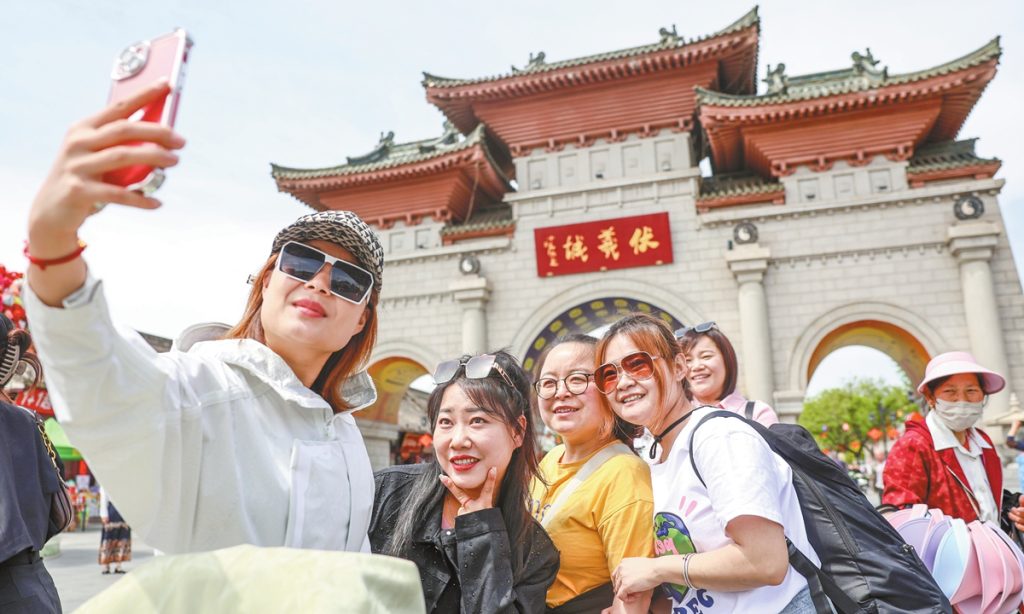A new time- and money-saving trend conquers young tourists

Eight attractions, 30,000 steps, 300 photos, dozens of iPhone video clips…traveler Qin concluded her 12-hour trip in Qingzhou county, East China's Shandong Province.
"It was a perfect journey," Qin shared on social media from a railway station in Qingzhou. Minutes later, she jumped onto a train leaving this time-honored small county.
Qin is among the growing Chinese tourists who are keen on being "special forces travelers." "Special forces travel" has grown into a new trend in China's tourism market over the past two years. The trend describes a travel style characterized by racing against the clock to hop from one destination to another, trying best to visit as many places as possible within an extremely limited time (and budget).
Why did this seemingly rushed, exhausting, military-training-like travel trend become popular? What will the trend bring to the Chinese tourism market? The Global Times spoke with some tourism experts and individual entrepreneurs engaged in related industries, who shared their personal experiences and thoughts on this booming craze.
Tiring but enjoyable
Qin calls herself a big fan of "special forces travel." Busy work and family chores have increasingly limited personal space of this seasoned traveler, so she decided to take full advantage of her weekends.
Including Qingzhou, this Shanghai resident has taken full advantage of her weekends and traveled to cities as far as 1,000 kilometers away, including the Tianjin Municipality, Shijiazhuang in North China's Hebei Province, and Changchun in Northeast China's Jilin Province. Excluding time spent sleeping and on the road, she typically only has about 10 hours to spend in the destination city.
In order to cover as many places as possible within an extremely limited time frame, each time, Qin meticulously plans her itinerary. This includes her arrival time, distances between attractions, and the estimated time she can stay at each attraction.
Qin doesn't find her itineraries tedious. "I enjoy the sense of accomplishment deriving from completing the 'tasks' one by one," she told the Global Times.
Different from Qin's solo weekend escapes, tourist Betty (pseudonym) enjoys embarking on road trips with her family, relishing in the precious moments of togetherness during their travels, however hectic and fast-paced they may be.
Betty travels on statutory holidays, when every member in her family is available. During the Chinese New Year holidays this year, Betty and her family drove to some 10 cities in southern China, including Nanning, Beihai and Zhuhai. To save time and money during the trip, they hit the road before 6 am, limited themselves to only one meal a day, and nibbled bread while on the road. "Like field training," she joked.
Betty explained that her family members are often busy and rarely get the chance to travel. "So each time we plan our family trip, we include as many destinations as we can," she told the Global Times. "It's tiring, but I really enjoy the time on the road with my loved ones."
Youth-friendly
The rise of "special forces travel" spurred the growth in related tourism services such as local guides and snacks trending on social media are blooming as well.
In Jieyang city of South China's Guangdong Province, a Gen-Z local guide nicknamed "Unicorn" uses her scooter and camera to show tourists around the city's key attractions.
"Unicorn" said many of her customers are "special forces travelers" particularly young females, who want to cover as many must-visit spots as possible in their short trips. "For them, I'm a good choice because I grew up here, and I'm very familiar with this city," she told the Global Times. "Also, I have a camera and can take photos for them."
"Unicorn" charges her customers 50 yuan ($7) per hour, which is affordable even for students, as it only takes one or two hour(s) to visit the city downtown, she said.
More than 85 percent of the "special forces travelers" are college students, said a report released by China Tourism Academy in December 2023.
It's not surprising that "special forces travel" is gaining momentum especially among young people, said tourism industry expert Yang Yong, who is a professor of the Faculty of Economics and Management at East China Normal University.
"This travel style allows tourists to visit many attractions in a short time, catering to the modern need of taking photos at the destinations and sharing them on social media, which has become a way people socialize nowadays," Yang told the Global Times. "Let alone the relatively lower cost of the 'special forces travel' is very friendly to young people."
Double-edged sword
The booming "special forces travel" has brought prosperity to some lesser-known destinations in China. For example, Zibo and Tianshui cities, which experienced a sudden surge in popularity overnight respectively due to their signature barbecue and malatang (a street hotpot), used to attract a large number of "special forces travelers" to visit; nonetheless, when these temporary local food crazes later cooled, travelers left, and once some snack shops had to close their doors, people started to realize that "special forces travel" is a double-edge sword bringing both opportunities and challenges.
Today many people travel according to the latest trends, but trends tend to change quickly. "Tourism practitioners must improve service quality to attract and retain visitors," Yang said, adding that "The industry needs to innovate and improve to better serve "special forces travelers and sustain the local tourism economy."